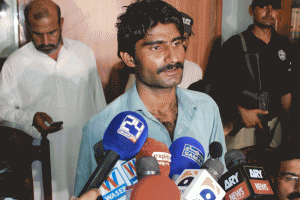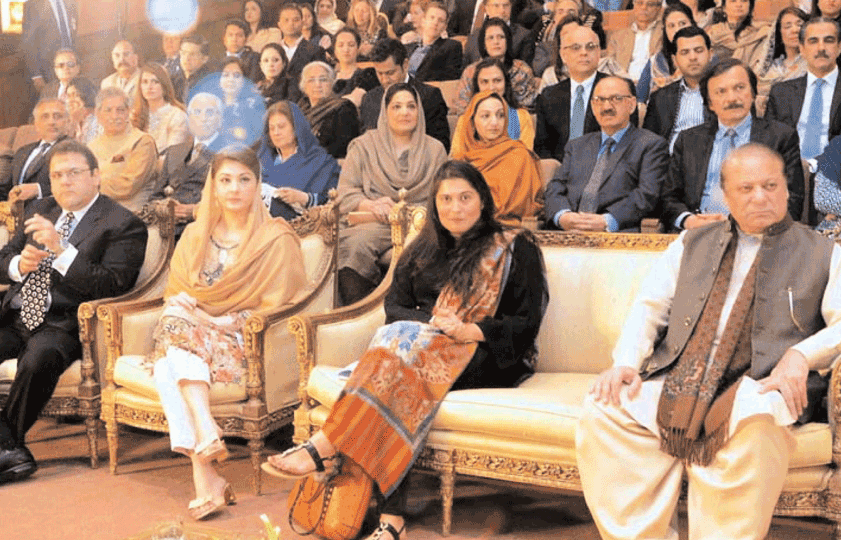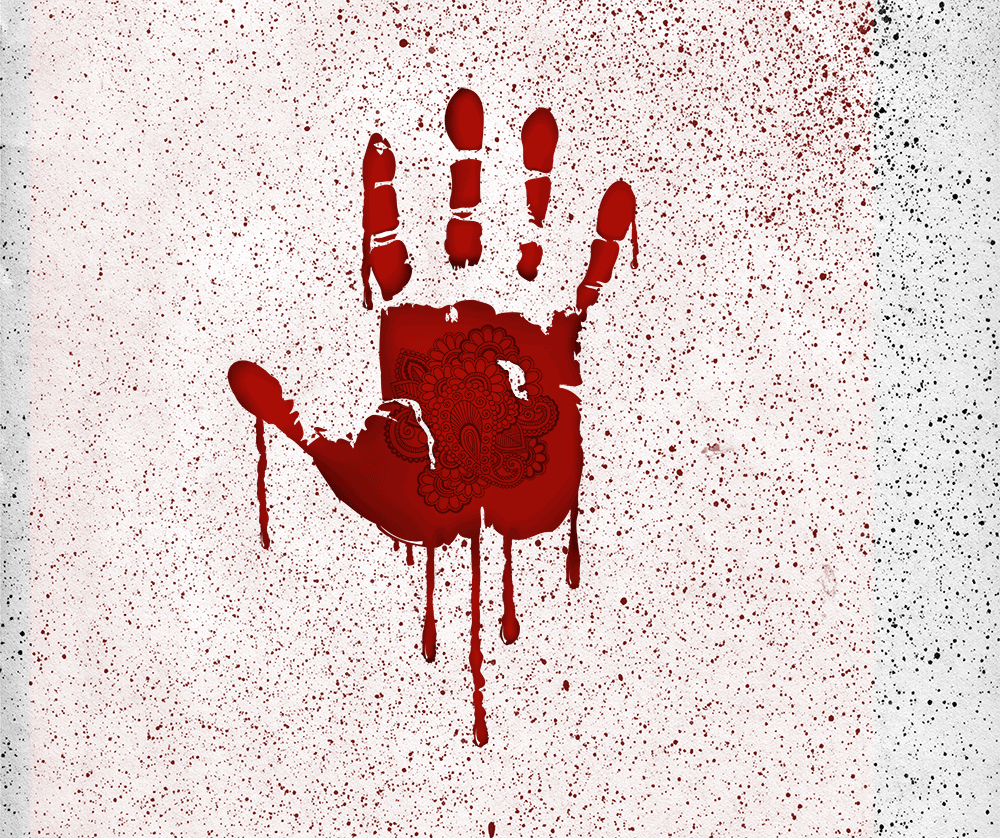Cover story: Murder in the Name of Honour
By Umer Ali | Cover Story | Published 9 years ago
“I am not embarrassed at all about what I did. Her behaviour was completely intolerable,” Wasim told reporters after being arrested for the murder of his sister, Qandeel Baloch, a rising social media celebrity. Baloch attracted attention due to the risqué photos and videos that she uploaded on her Facebook and Instagram accounts.
 “Yes, of course, I strangled her. She was on the ground floor while our parents were asleep on the rooftop,” her brother said with a smirk, adding, “It was around 10:45 p.m. when I gave her a tablet and then killed her.” As the cameras flashed and reporters threw question after question at him, there was no sign of remorse on his face. To justify the murder, he said Qandeel had breached the family’s honour, which had to be protected.
“Yes, of course, I strangled her. She was on the ground floor while our parents were asleep on the rooftop,” her brother said with a smirk, adding, “It was around 10:45 p.m. when I gave her a tablet and then killed her.” As the cameras flashed and reporters threw question after question at him, there was no sign of remorse on his face. To justify the murder, he said Qandeel had breached the family’s honour, which had to be protected.
This is not the first case of honour killing and will definitely not be the last. In the holy month of Ramzan, when Muslims are supposed to exercise restraint, 49 cases of honour killings were reported across the country. FIRs were registered for 38 cases, while no data was available for the remaining 11 cases. In many instances, there were multiple murders, as both the male and the female were killed. Data available with the Human Rights Commission of Pakistan report that 23 males and 44 females were killed from June 6, 2016 to July 6, 2016.
Since the start of 2016, honour-related crimes have been in the spotlight in the media, and in the corridors of power. For a change, Prime Minister Nawaz Sharif himself took a stand to denounce honour killings, after meeting Sharmeen Obaid Chinoy — the filmmaker who won her second Oscar for a documentary on a survivor of an honour-killing attempt.
Titled A Girl in the River, the documentary revolves around the story of 19-year-old Saba. Going against the prevailing norms in a conservative society, she eloped with the boy she loved — to her family’s wrath. Her father, with the assistance of her uncle, shot her, put the bleeding body in a sack and threw it into the river. She miraculously survived to tell the world her tale. Her case was taken up by Advocate Asad Jamal, but he soon realised that a compromise had been reached between the victim and family, after which she refused to pursue the case further. This is not the first time that such a compromise has been reached.
Talking to Newsline, Reema Omer, Legal Advisor at the International Commission of Jurists, explains, “The Qisas and Diyat laws allow murder (and other violent crimes) to be pardoned by heirs of the victim.”
The Criminal Law Amendment introduced in 2005 provided judges with an option to reject a compromise in honour killings. However Ms. Omer thinks the provision is not effective at all. “In most cases, judges don’t exercise this discretion in favour of the prosecution and accept the compromise,” she said, adding, “In other cases, the compromise happens informally, even before the legal process kicks in.”
Advocate Asad Jamal, discussing the Criminal Law Amendment 2005 says, “Section 302-A of the Pakistan Penal Code prescribes the death penalty for Qatl-e-Amd (intentional murder) in cases related to Qisas. In Section 302-B, the punishment might be either death penalty or life imprisonment. In Section 302-C, the prescribed punishment is 25 years imprisonment. According to the 2005 amendment, only Section 302-A or Section 302-B can be applied in cases of honour killings, meaning the imposition of either the death penalty, or life imprisonment, which, of course, is a good thing.
The 2005 Criminal Law Amendment further treats honour killings as Fisad Fil Arz, declaring the minimum punishment to be 10 years imprisonment. Under this amendment, compromise between the two parties, which often are of the same family, can be rejected by the court to award at least 10 years imprisonment. What is the problem, then?
Asad Jamal has elaborated on how Qisas and Diyat laws affect the implementation of the given amendment. “Diyat (blood money for the offence of killing or bodily hurt) and Qisas (waiver or pardon accepted for the offence of killing or bodily hurt) were introduced in the Pakistan Penal Code (PPC). Since these options were left entirely — even though in cases of Qisas only — to the discretion of the legal heirs of the victims, they have had an adverse impact on the entire criminal justice system. Each instance of every offence against the human body — including murder, and the so-called ‘honour’ crimes — is now considered to be de facto pardonable or compoundable,” says Jamal.
Ms. Omer adds, “Since heirs are family members of the killer in honour killing cases, it is common for them to reach a compromise, often even before the trial begins.”
According to statistics available with the Human Rights Commission of Pakistan (HRCP), 8,057 cases of honour killing have been reported in local and national newspapers since January 2004. In these cases, an overwhelming majority of those killed were women. The motive behind 1,443 such cases was a marriage of choice, while 6,051 cases were said to have taken place over suspected illicit relations. At least 460 women were killed because they were thought to have brought shame and dishonour to the family name, as rape survivors. The reasons for the rest include enmity, financial issues and property disputes.
In 2,420 cases, the perpetrator was the husband of the deceased. In 624 cases, parents killed their daughters and in 1,816 cases, siblings were involved in the murders. In other cases, in-laws, sons and daughters were responsible for the killings.
Ayesha Iftikhar, a Lahore-based psychologist and researcher, believes honour killings are about maintaining social identity and repairing damage to the perceived status. “When a woman does anything to shake up a family’s idea of itself, the family experiences a threat to its psychological safety,” she says.
“There are two forces at play here. First, collectivist cultural values that emphasise the group over the individual. In Pakistan, losing honour means you will be shunned and ridiculed. You are excluded from the spheres of your daily social interaction. Honour killing, then, is the price of readmission into one’s social circles,” Ms. Iftikhar adds.
Over time, there have been several attempts to bring these murderers to book, but the issue took on a fresh urgency when people were jolted by the murder of 18- year-old Zeenat. This time, it was a mother, who, with the help of her son, had burnt her daughter alive. The motive was familiar — Zeenat married a boy of her choice, bringing shame and dishonour to the family. Thus she had to be eliminated.
After massive coverage of the murder by national and international media, a quick investigation was launched to discover that Zeenat’s brother was an accomplice to her murder, but the mother had lied to the police to shield her son.
Earlier this year, a 20-year-old man was arrested in Karachi for the murder of his younger sister. After seeing his sister talking to a youngster at their door, he got angry and pulled out a knife and slit her throat. It might have been just another closed case after the killer’s father pardoned him, but the video of the attack went viral on social media — sending shockwaves across the country. In that case, the police became the complainant to make sure the murder remained a non-compoundable offence.
In late July another case hit the headlines. This time, Samia Shahid, a British woman of Pakistani descent, was allegedly murdered by her family as she had remarried against their wishes. A week after Samia’s arrival in Pakistan to visit her family in a village in Jhehlum district, her husband, Dubai-based Mukhtar Kazim was told by Samia’s cousin that she had suffered a fatal heart attack. Kazim contests the family’s version of events, saying Samia was murdered by the family.
Incidentally, a female PPP Senator, Sughra Imam, had drafted an Anti-Honour Killings Laws Bill 2014, which was passed unanimously by the Senate, after which it was sent to the National Assembly — where it was allowed to lapse. Talking to Newsline, PPP Senator Sughra Imam, said that after it lapsed, she followed procedures to take it up again in the Senate, where it was referred to the Joint Session of Parliament.
“The basic purpose of this bill is to make honour killings a non-compoundable offence. Over several years, I have seen killers escaping punishment because their families had reached a compromise,” she said. “This lapse in the law has enabled more men to kill with impunity, knowing they would go scot-free after a few months,” Ms. Imam added.
While condemning the murder of Qandeel Baloch, former President and Co-Chairman PPP, Asif Ali Zardari criticised the PML-N government for being unable to produce the bill in a joint session of Parliament. “It is strange that the bill was endorsed by all political parties, including the religious parties and the PML-N in the Senate, but they (government) dithered on its adoption in the last joint session of Parliament. This raises questions about their motives,” his statement said.
Amidst the heated debate over the Qandeel Baloch case, Maryam Nawaz Sharif, announced on twitter that “The two pro-women bills will be discussed in a special parliamentary committee meeting, whose first meeting is going to be held today (Thursday-July 22), and the bill will be passed.” A special body was constituted by the government Committee of Joint Sittings Bills to expedite the long delayed legislation. Subsequently, consensus was reached on the bill and it is to be presented in the joint sitting of parliament called for August, along with an anti-rape bill.
Senator Sherry Rehman, while talking to Newsline, emphasised the importance of the Anti-Honour Killings law. “This is crucial to changing the culture of impunity that crimes against women currently enjoy, thanks to amendments made in the law several years ago by dictators.” Rehman says, “The Honour Killings Bill I had introduced in 2004 was butchered by General Musharraf’s cabinet, but even that prohibited the direct heirs of a victim from compounding the crime.”
Criticising the reluctance of the PML-N to table the Anti-Honour Killing Laws Bill, she added, “Despite promises to the international media at a high-profile screening of Sharmeen Obaid-Chinoy’s Oscar-winning documentary against honour killings, the PM has yet to give the green light to the bill that will criminalise honour killings.”
When contacted, PML-N MNA Maiza Hameed asserted that Prime Minister Nawaz Sharif remained committed to his promise of reforming the honour killings laws.
The Anti-Honour Killing Laws (Criminal Law Amendment) Bill 2015 and the Anti Rape Law (Criminal Laws Amedment Bill) 2015 was presented in the joint session in March 2016. The JUI-F raised objections. The bill is now to be tabled in the next joint session.
As the work on amending the Anti-Honour Killings Laws Bill proceeds, both Reema Omer and Asad Jamal find several loopholes in its current form.
Although the bill makes all crimes in the name, or pretext of honour, non-compoundable, removing the option of any compromise whatsoever, Ms. Omer believes there is still room for improvement.
“It leaves the definition of ‘honour killing’ the same as it is in the penal code currently — an “offence in the name of honour is an offence committed in the name or on the pretext of karo kari, siyah kari or other similar customs or practices,” she says, adding, “this is a tautological and imprecise definition, which needs to be elaborated and made more specific.”
Asad Jamal, however, believes this is an important issue but says there is much missing in the current form and context of the bill. “The bill focuses on the non-compoundability of only killing in the name of honour and no other crimes like bodily harm or attempted murder,” he says. Reema Omer also agrees that the bill must include the provision of non-compoundability for honour crimes other than killing too.
Omer further adds, “It [Anti-Honour Killings Laws Bill] attempts to chip away at provisions of the Qisas and Diyat Ordinance without confronting the problem of `privatisation of justice’ — which is essentially what happens when you give heirs of the victim the power to decide whether there should be prosecution and punishment and remove the state from the equation.”
The bill, in its current form, has drawn severe criticism and opposition from the far-right JUI-F, which termed some of its provisions to be against the teachings of Islam. Asad links the existence of these laws to the Islamisation of the constitution. “For years, lawmakers have let the Qisas and Diyat laws play along because no one dared to question the credentials of these laws termed Islamic by many,” he explained.
Columnist and researcher, Nazish Brohi, believes that along with formulating and implementing laws to counter honour killings, it is important to look at the phenomenon itself. “I think there has been a definite rise in incidents, and this is a modern phenomenon,” she says. Ms. Brohi feels there is a shift in the nature of the cases. Earlier, according to her, women were killed based on accusations that were cover-ups for money or property issues.
“Now, more and more women are making decisions about their bodies, deciding whom they want to marry. The rise in attacks is a response to women becoming more assertive about their rights,” she adds.
Ayesha Iftikhar believes honour crimes are mostly tied to the masculinity of the murderer. “There are cultural ideals of an acceptable masculine identity which prescribe a certain response to any behaviour deemed unacceptable: thus, for many, a “real” man is one of action, not words, of territoriality, who “protects what is his, who does not tolerate an insult or offence; even his anger is celebrated as evidence of his masculinity,” she says.
To address honour killings, she therefore asserts that in addition to emphasising the rights and liberties of women, we need to address these psychological constructs of what it means to be a Muslim, Pakistani male — exploring alternative acceptable visions of masculinity and sense of self — which may play a role in countering the appeal of violent and reactionary narratives.
Asad Jamal, who has studied almost all the judgments in honour killing cases, also asserts that while laws are important, it’s the thinking that needs to be changed. “Our curriculum needs to be changed to promote women playing roles in the public sphere, not just to be portrayed as mothers, teachers and nurses. They are mostly shown in a passive role-playing capacity, as loving and obedient and always at the receiving end, with an infinite capacity to be patient, and bear with insults and excesses against their body and mind,” he says.
Jamal further says that children, especially males, should be taught at the earliest school stages that women are leaders too and that they cannot be taken for granted. “They should be respected in a way which demonstrates appropriation of dignity and equality and only then can we expect a real change,” he concludes.
A grisly chronicle of some of the honour killing cases that made it to the media.
Buried Alive
One of the most horrific stories of honour killings that came to light, in 2008, was that of five women who were buried alive in a remote village in district Nasirabad in Balochistan, allegedly by Abdul Sattar Umrani, younger brother of Mr Sadiq Umrani, provincial minister and prominent leader of the Pakistan People’s Party, the ruling party at the time.
The reason for this brutality was that three of the girls aged 16-18 years and in classes 10-12, wished to marry men of their choice, in court, as the elders of the tribe had refused them permission to marry. This apparently infuriated Sattar Umrani, who, along with his henchmen, abducted the three girls and a mother and an aunt. The girls were beaten and shot but survived. When the mother and an aunt tried to intervene, all five were pushed into a wide ditch and covered with earth and stones and left to die.
The police did not register a case even a month after the incident. Sadiq Umrani, while confirming the incident denied his or his brother’s involvement. Perhaps what is even more horrific is that Balochistan Senators, Israrullah Zehri and Chand Mohammad Jamali, defended the brutal act on the floor of the Senate, saying it was part of Baloch tradition.
Dance of Death
In May 2012, in the Gadar village of district Kohistan, a cleric and head of a jirga comprising 12 elders from different tribes sentenced four women; a minor girl from Azadkhel tribe, and two brothers from Salekhel tribe to be killed in the name of honour. A shaky video on a cell phone had emerged in which the two boys were seen dancing to music while the women were clapping. The four women and the girl were killed by the relatives, but the boys who were from another tribe, fled the village.
However, the relatives of the women went after the family of the boys, eventually killing three of their brothers and were searching for the others to equal the numbers to their women who were killed. The issue made it to the national and international media and has been the subject of recent documentaries on honour crimes. A fact-finding commission was sent by the Supreme Court, but the jirga deceived them by producing two girls as those who were filmed in the video, and refuted that any such incident had taken place.
The case was disposed off. Afzal Kohistani, brother of the accused boys, and the three boys who were killed in their stead, brought the issue forth once again. The district court in Kohistan sentenced one of the murderers of the boys to death and five others to life imprisonment in 2014.
The Murder Trap
In the latest breaking story in a series of honour killings of women, is that of the beauty therapist from Bradford, Samia Shahid, 28, a British woman of Pakistani origin, on July 20. According to the Dawn/ Guardian story published in Dawn, July 27, Samia was previously married to her cousin, Chaudhary Shakil, and after their divorce in 2014, married Syed Mukhtar Kazim and moved to Dubai. Her parents were living in a village near Mangla in Jhelum District.
Samia ‘s husband said she received a call from her mother on July 11 informing her that her father was unwell and that she should come see him. Samia reached her parents home on July 14, and soon called to tell her husband that her father was, in fact, well, and she felt threatened. Kazim said that Samia’s phone was switched off on the 20th and when he called her cousin, Mobeen, to find out why, was informed that Samia had suffered a heart attack. Her death was apparently reported to the Mangla police by her father on July 20. Kazim reached Pakistan on July 21 and filed a murder charge against Samia’s parents, sister, cousin and former husband, who have all vehemently denied the allegations.
Meanwhile, British MP, Naz Shah, has written to Prime Minister Nawaz Sharif, asking for justice should this prove to be yet another case for honour killing. Forensic investigation results are awaited.
Cold Blooded
In April 1999, in perhaps the first such reported case of its kind, an educated mother, a doctor, well-off and well respected in Peshawar society, brings along an assassin at a pre-arranged meeting with her daughter, seeking a divorce from an abusive husband, at advocate Hina Jilani’s chambers in Lahore, and has her killed.
Cold-blooded. Pre-meditated. A police guard, in turn, kills the assassin, but the mother and uncle make their getaway, taking another female lawyer as hostage. Samia Sarwar’s killing sent shock waves through the country. This was not a girl from a village or from a poor, illiterate, ignorant family: mother a doctor, father a successful businessman and President of the Peshawar Chamber of Commerce. The parents had just returned after performing Haj!
Why would the parents commit such a crime? Kill their own daughter who had already been separated from her husband (her mother’s nephew) for four years and was living with them with her two children. What crime did Samia commit? Was the code of ‘honour’ of the family breached because, she, a young woman, wanted a divorce — perhaps to make a fresh start in life?
The parents were never prosecuted. In fact, they received support from some ‘’distinguished’’ political figures. Ajmal Khattak of the ANP and other members of the Senate defended the killing of Samia Sarwar by her family as part of Pakhtun tradition. Chairman Wasim Sajjad of the Senate did not allow a tabling of the matter or any discussion on the issue in Senate.







